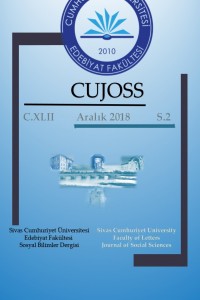Öz
Parents’
responsibility is an important concept that we can find in both human-made laws
and divine laws. By taking into account the Abrahamic religions’ (i.e. Judaism,
Christianity and Islam) Holy Writings, parents take up these responsibilities,
such as protecting them and catering to their basic needs, nurturing a child’s
religious life by using different methods and becoming good examples. Thereby,
in order to preserve the integrity of the child, while continuing to serve as a
guide, the spiritual aspects must be preserved and developed in the same way.
However, the three Abrahamic religions have their own perspective on family,
and mother-father roles in a child’s religious nurture at home. In this paper
which is a comparative study, it hasbeen tried to explain the parents’
responsibilities regarding shaping their children innate religious instincts
based on the Holy Writings of Abrahamic religions. The paper which is conducted
with the literature review methods, is formed of introduction and two parts.
The first part describes the parents’ responsibility related to meeting their
children physical needs, while the second part focuses on parents’
responsibilities in the spiritual life of children. In the end and, it is
discussed the common grounds and discrepancies between the Abrahamic religions’
views on parent’s responsibilities. Despite the discrepancies and competition
between the Abrahamic religions, the most important point of this common ground
is that parents have been taken in charge by God as a reflection and placement
of divine reality in their children’s lives. This task consists of nurturing
the belief of their children, and gaining knowledge and skills that will help
them to live according to God’s warnings and instructions in all phases of
their lives, whatever education style parents choose.
Anahtar Kelimeler
RELIGIOUS NURTURE THE ABRAHAMIC RELIGIONS PARENT'S RESPONSIBILITY
Kaynakça
- ABŪ DĀWŪD, S. (2009). Sunan Abī Dāwūd. Riyadh: Dār al-Salām.
- AL-BAYHAQĪ, A. (1994). Sunan al-Bayhaqī al-Kubrā. Makkah: Maktabat Dār al-Bāz
- AL-BUKHĀRĪ, M. (1987). Ṣaḥīḥ al-Bukhārī. Beirut: Dār Ibn Kathīr.
- AYDIN, M. A. (1989). “Aile”, Diyanet İslam Ansiklopedisi, vol. 2, TDV Yay., 196-200.
- BASALEL, Y.(2001). Yahudilik Ansiklopedisi, Gözlem Gazetecilik Basın ve Yayın A.Ş, İstanbul.
- BUNGE, M. J. (2008). “Biblical And Theological Perspectives On Children, Parents,- And ‘Best Practices’ For Faith Formation.” Dialog A Journal Of Theology, 47(4): 348-360.
- CANAN, İ.(2005). “İslam’da Aile Terbiyesi”, In İslam’da Aile ve Çocuk Terbiyesi-2 Sempozyumu, edited by İbrahim Canan, 23-42. Ensar Yay: İstanbul.
- CANAN, İ.(1988). “Kur’an’da Çocukla İlgili Meseleler.” Atatürk Üniversitesi İlahiyat Fakültesi Dergisi 2 (8): 19-42.
- KURTTEKIN, F. (2017). Karma Evliliklerden Doğan Çocukların Din Eğitimi, Yayınlanmamış Doktora Tezi, Sivas: Cumhuriyet Üniversitesi Sosyal Bilimler Enstitüsü.
- HÖKELEKLI, H.(1993). “Çocuk”, DİA vol. 8., Ankara : TDV Yay., 355-359.
- NURIMAN-FAUZAN. (2017). “The Influence of Islamic Moral Values on the Students’ Behavior in Aceh”, Dinamika Ilmu 17(2): 275-290.Doi: http://dx.doi.org/10.21093/di.v17i2.835.
- YASDIMAN, Hakki Şah. (2001). “Yahudi Dininde Ailenin Yeri”, Dokuz Eylül Üniversitesi İlahiyat Fakültesi Dergisi, 13 (14): 241-266.
- http://www.newworldencyclopedia.org/entry/Halakha. Accessed, 13.10.2018
- https://www.sefaria.org/?home. Accessed, 9.10.2018.
- https://www.biblegateway.com. Accessed, 9.10.2018.
- https://sunnah.com. Accessed, 10.10.2018
- https://quran.com. Accessed, 10.10.2018.
Ayrıntılar
| Birincil Dil | İngilizce |
|---|---|
| Bölüm | Articles |
| Yazarlar | |
| Yayımlanma Tarihi | 12 Aralık 2018 |
| Yayımlandığı Sayı | Yıl 2018 Cilt: 42 Sayı: 2 |

Bu eser Creative Commons Atıf-GayriTicari 4.0 Uluslararası Lisansı ile lisanslanmıştır.

